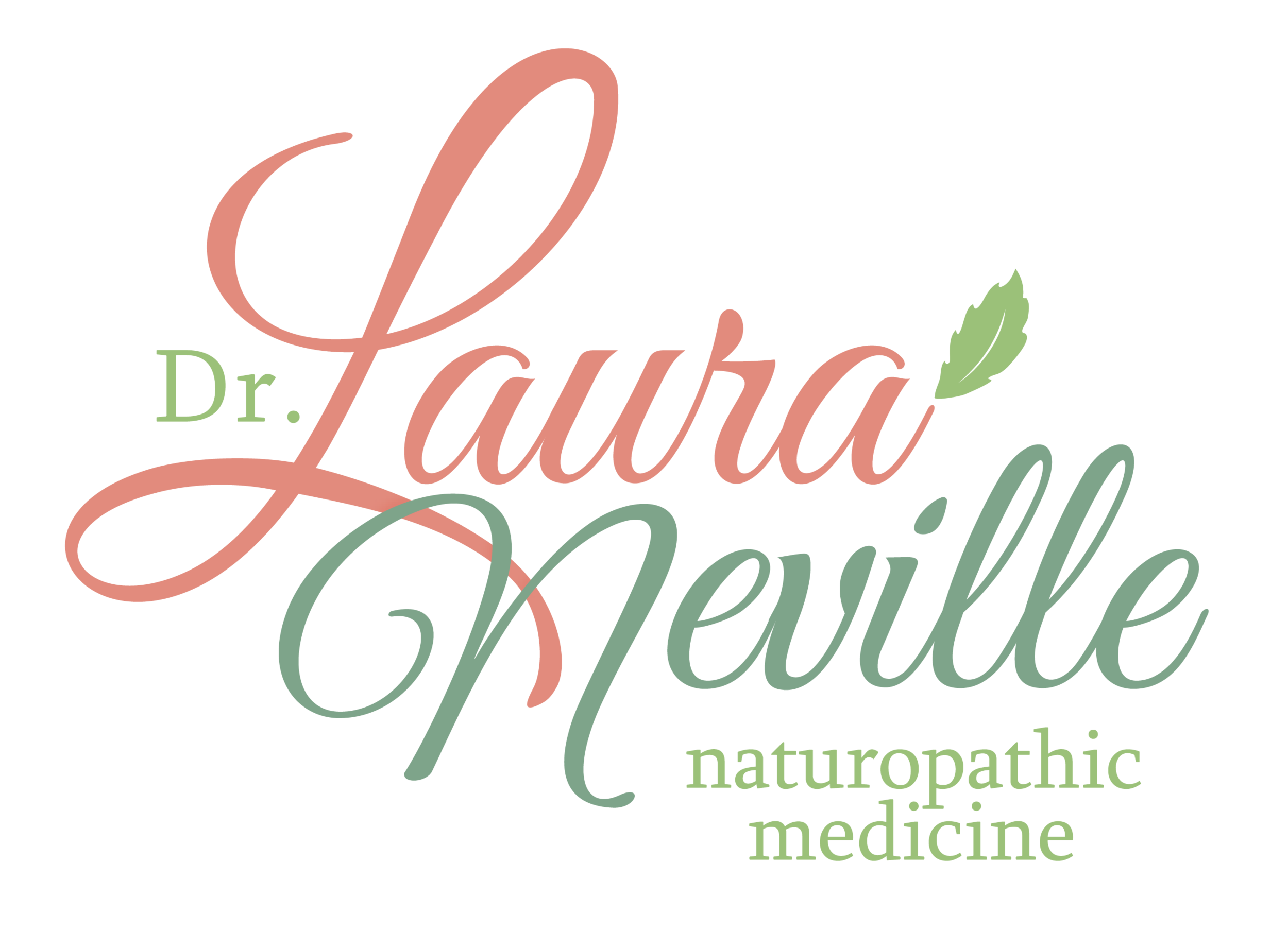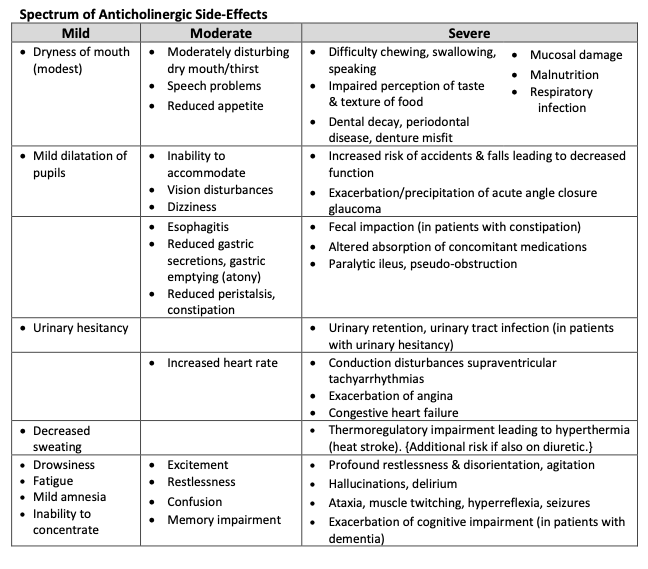Common Medication Side Effects Explained
Acetylcholine = Memory, Muscles, and Moistness
Acetylcholine is a neurotransmitter that plays a role in memory, learning, attention, arousal and involuntary muscle movement. It’s an excitatory neurotransmitter. This means it “excites” the nerve cell and causes it to “fire off the message.”
It also plays a role in many bodily secretions (more on this later).
An acetyl group (acetyl coenzyme A, which comes from the sugar molecule glucose) and the nutrient choline combine to make acetylcholine. Choline is naturally present in foods, including egg yolks, soy, liver, seeds of vegetables and legumes. Choline is also made in the liver.
Medical conditions associated with low acetylcholine levels include Alzheimer’s disease and myasthenia gravis but many common meds inhibit acetylcholine. These include:
certain antibiotics
antidepressants
antihistamines
antiparkinsonian meds
antipsychotics
antiseizure meds
antispasmodics
some cardiovascular agents
some gastrointestinal agents
some respiratory meds
immunosuppressants
muscle relaxants
opioids
*More specifics on these later
So Why Should You Care?
These common meds (listed above) can cause odd effects, and I want you to simply be aware so you know what is going on with your own body. You have the right to know!
Let me first explain what acetylcholine does in more detail so we can understand what happens when acetylcholine is blocked.
Acetylcholine has many Roles:
When it binds to certain receptors called “muscarinic receptors” it:
Regulates heart contractions, blood pressure, and decreases heart rate.
Moves food through the intestine by contracting intestinal muscles and increasing digestive secretions.
Causes glands to secrete tears, saliva, milk, sweat, and digestive juices.
Controls the release of urine.
Contracts eye muscles that control near vision.
Causes an erection.
When it binds to other receptors called “nicotinic receptors” it:
Allows skeletal muscle to contract.
Causes the release of adrenaline and norepinephrine from adrenal glands to activate the sympathetic, “fight or flight” nervous system
Both types of receptors are involved in memory, including long-term and working memory, but also memory formation, consolidation and retrieval.
Meds with Anticholingeric Activity would Cause the Opposite of all of the Above, to some Degree.
Anticholinergics are drugs that block the action of acetylcholine. They can treat a variety of conditions, including:
Certain types of poisoning
However, many Medications, though not Considered Anticholinergics, have at least some Anticholinergic Activity, Leading to what are Referred to as Side Effects.
These include:
Antihistamines like Benadryl, Allegra, Claritin, Zyrtec
Antidepressants
Anti-anxiety meds
Pepcid, Zantac
Midol, Pamprin
Certain migraine medications, including the triptan family
Metformin
Lithium
These meds, because of anticholinergic activity can cause:
Heart palpitations, increased heart rate, slowed digestion/constipation, dried secretions (less tears, dry mouth, dry eyes, etc), inability to urinate completely, blurry vision, erectile dysfunction, muscle twitches, sometimes a nerve-like zinging feeling, and drowsiness. See chart below for a more thorough list of side effects.
For a full list of meds with anticholinergic activity, you can download this document: (note - it’s Canadian, so some of the med names may be slightly different from you are used to seeing).
Blue = low anticholinergic activity
Red = Moderate/high anticholinergic activity
Drugs with ANTI-CHOLINERGIC Effects
Other Examples of Acetylcholine Changes:
The venom from the bite of a black widow spider dramatically raises the acetylcholine level causing severe muscle contractions, spasms, paralysis and possible death.
Botulinum toxin — used to treat muscle spasticity, cosmetic wrinkles and migraines — works by preventing acetylcholine release from the end of nerve cells.
Supplements that increase acetylcholine release or that stop the breakdown of acetylcholine are thought to increase acetylcholine levels. One such supplement that increases acetylcholine release is choline. Supplements that stop the breakdown of acetylcholine include Bacopa monnieri, Ginkgo biloba and huperzine A.
Atropa belladonna is a plant that contains neurotoxic alkaloids that block acetylcholine. Poisoning of the plant causes sedation, disorientation, memory loss, muscle spasms, coma, and death. Shakespeare’s star-crossed lover, Juliet, most likely committed suicide by consuming a handful of the highly toxic Atropa berries.
This plant gets its species name, belladonna, which is Italian for “beautiful woman,” because of its effect on the eyes. In 16th-century Italy, women applied eye drops prepared from deadly nightshade because it dilated the pupil, which was thought to make them look beautiful.
Atropine eye drops are still used by ophthalmologists to dilate a patient’s pupils and get a good view of the retina during an eye exam.
In Medical School, these Old Rhymes are used by Students to Remember the Drug’s Mechanisms:
“Can’t see, pee, spit or sh*t”
and “Hot as a hare, dry as a bone, red as a beet, mad as a hatter, blind as a bat”
Anticholinergic Meds and Dementia:
In 2019, JAMA published a study associating anticholingeric meds with dementia.
Researchers found that “there was nearly a 50% increased odds of dementia” associated with a total anticholinergic exposure of more than 1,095 daily doses within a 10-year period, which is equivalent to an older adult taking a strong anticholinergic medication daily for at least three years, compared with no exposure.
The link is strongest for certain classes of anticholinergic drugs – particularly antidepressants such as paroxetine (Paxil) or amitriptyline (Elavil), bladder antimuscarinics such as oxybutynin (Ditropan) or tolterodine (Detrol), antipsychotics such as chlorpromazine (Largactil) or olanzapine (Zyprexa) and antiepileptic drugs such as oxcarbazepine (Trileptal) or carbamazepine Tegretol).
My Take
The JAMA study was an observational study so no firm conclusions can be drawn yet, but knowing what we know about how these meds work- drying out the brain and blocking actyelcholine, a neurotransmitter involved in memory, I argue that less is more with any medication that has anticholinergic effects.
This is also why I love to see patients transitioning off chronic use of over-the-counter allergy meds, heartburn meds, sleep meds like Unisom, and using anti-depressants and anti-anxiety meds when needed, but in the lowest dose, for the shortest period of time possible. *Check with your doctor before changing or discontinuing any medications.
And if you have odd side effects that were never fully explained to you, now you won’t feel crazy!
Naturopathic medicine can offer root-cause healing so less of these medications with anticholinergic activity are necessary.
💕
Dr. Laura Neville
Coupland CAC, Hill T, Dening T, Morriss R, Moore M, Hippisley-Cox J. Anticholinergic Drug Exposure and the Risk of Dementia: A Nested Case-Control Study. JAMA Intern Med. 2019;179(8):1084–1093. doi:10.1001/jamainternmed.2019.0677

